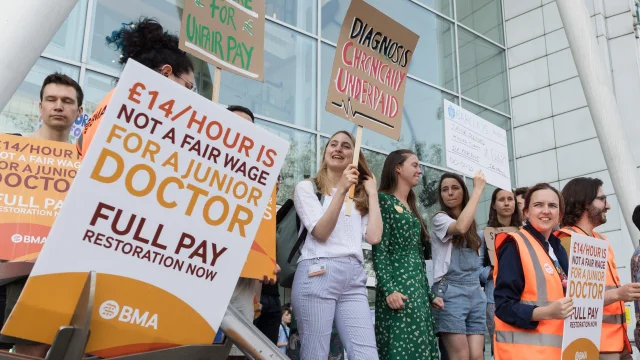By Gavin Mackintosh-
Millions of UK public sector workers, including teachers and doctors, will get pay rises of about 6% after Rishi Sunak decided to accept the recommendations of independent pay review bodies.
The bodies had suggested pay rises of between 6% and 6.5% for 2023-24, at a potential cost of £5bn.
The welcome rise came in the wake of planned strike action which threatened to continue disruptions in the public sector.
Mr Sunak met Jeremy Hunt, the chancellor to finalise the decision this morning, which involves around 45% of the public sector, but does not include the majority of civil servants.
Increasing wage payments demonstrates recognition and appreciation for the important work performed by public sector workers. It acknowledges their contribution to society and the value they bring to their respective professions.
Competitive wages is also considered to be crucial to attracting and retaining skilled professionals in the public sector. By addressing concerns related to wages, the government can help ensure that essential services such as education and healthcare have a sufficient workforce.
The action by the government in addressing this wage concerns through negotiations and increasing payments is seen as demonstrating a commitment to collective bargaining and resolving disputes through dialogue. It highlights the importance of fair labour practices and collaborative decision-making.
The pay increases each public sector will receive are as follows:
The general secretaries of four education unions described the 6.5% pay rise as “the largest ever recommendation” from the School Teachers’ Review Body (STRB) and said they would recommend their members accept it and call off strike action.
“A 6.5% increase for teachers and school leaders recognises the vital role that teachers play in our country and ensures that teaching will continue to be an attractive profession,” they said.
“The government has accepted the STRB’s recommendation and has agreed to bring forward wider reforms to reduce teacher and leader workload in partnership with all four unions.”
They added: “Importantly, the government’s offer is properly funded for schools.
“The government has committed that all schools will receive additional funding above what was proposed in March – building on the additional £2bn given to schools in the Autumn Statement.
“The government will also provide a hardship fund of up to £40m to support those schools facing the greatest financial challenges.
“This deal will allow teachers and school leaders to call off strike action and resume normal relations with government.”‘
In a press conference shortly after the offers were unveiled, the prime minister said they were “final” and “one of the most significant” pay awards in decades – costing “billions of pounds more than the government had budgeted for”.
He confirmed the pay awards were not going to be funded by increased borrowing or higher taxes but through other avenue – including an increase to the charge migrants have to pay when they apply for visas and to the immigration health surcharge, the levy migrants have to pay to access the NHS.
Mr Sunak said the move would raise over £1bn.
The prime minister’s announcements comes as junior doctors kick off the longest strike in NHS history, with young medics walking out from 7am today and returning on Tuesday.
Members of the British Medical Association (BMA) want their pay to be raised by about 35% – a figure Health Secretary Steve Barclay has described as “not fair or reasonable”.
Asked about whether the 6% pay rise for junior doctors could be considered “fair” given it is considerably less than the 35% they are asking for, Mr Sunak said they would also receive an additional consolidated £1,250 increase”.
He said that the independent pay review body process “has been accepted as the best, fair way, that we have in this country to find resolution on public sector pay”.
Mr Sunak was repeatedly asked about concerns that the pay rises could fuel inflation – contrary to the promise he made to halve inflation by the end of the year.
The current level of CPI inflation is running at 8.7% and Mr Sunak is seeking to avoid pay increases that could fuel a wage-price spiral.
Asked what level inflation would have to fall to to reach his target, Mr Sunak told the press conference: “Do I think that everyone sitting at home is focusing on whether inflation goes down to 5.2%, 5.4% or 5.3%?
“No, I don’t. Actually what I think they want to know is that the Government is committed to easing the burden on their cost of living.”
The FDA trade union, which represents professionals and managers in public service, welcomed the government’s decision to accept the recommendations of the independent pay review bodies.
FDA Assistant General Secretary Amy Leversidge said: “The recommendations from the SSRB [Senior Salaries Review Body] are in line with the rest of the civil service and public sector, and are both fair and reasonable.
“If the government is to address the chronic issues facing our public services, the civil service needs to be able to recruit and retain talented, skilled and knowledgeable civil servants.
“The government now needs to learn the lessons from the last twelve months of damaging disputes, by strengthening the role and independence of the pay review bodies, and tasking them with delivering the long term structural reform that will support the workforce strategies so desperately needed across our public services.”




